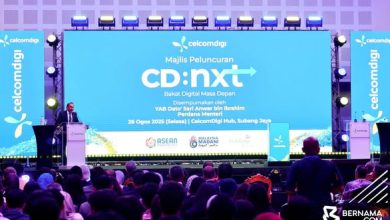The Blueprint for Digital Confidence: Sovereign AI as a Strategic Advantage
Sovereignty as a Strategic Enabler of Trust, Capability, and Innovation

As Artificial Intelligence (AI) reshapes the global digital landscape, we stand at a pivotal moment—where decisions made today about AI governance, infrastructure, and innovation will shape public trust, national resilience, and regional competitiveness for years to come. AI is no longer just a set of emerging tools—it is influencing how governments deliver services, how policies are formulated, and how nations chart their economic futures. In this environment, sovereignty has become a strategic enabler of trust, capability, and innovation.
Malaysia, as the Chair of ASEAN Summit in 2025, has embraced this reality by taking proactive steps toward building a trusted digital ecosystem anchored in Sovereign AI. During the recent ASEAN Summit, Malaysia’s approach such as redefining national sovereignty for AI, ASEAN Responsible AI Roadmap, was recognised for going beyond aspiration—with clear efforts to align national policies, infrastructure, and talent development programmes to support responsible, scalable AI deployment across the region.
This moment demands more than innovation for innovation’s sake. It requires us to ask deeper questions: Who owns the data? Who governs the outcomes? How do we ensure AI serves national priorities rather than undermine them?
Technology as an Enabler of Sovereignty and Scale
At Dell Technologies, we believe that technology is not the solution on its own—it is the enabler of sovereign capability. In our recent Sovereign AI whitepaper for Asia Pacific and Japan, with research and insights by IDC, it revealed findings where investments toward Sovereign AI are on the rise—approximately 46% of Asia Pacific government agencies are trialling on AI and GenAI applications, and 33% of AI investments are funnelled into Sovereign AI.
Bringing the case closer to home, Sovereign AI remains part of the national AI strategy. The report highlighted substantial government investments made in AI and GenAI, with projections indicating that AI-related solutions could contribute approximately USD $55 billion in economic value to local businesses by 2030. This momentum is reflected in accelerating adoption trends, with reported AI adoption at 67% and 57% of GenAI usage. Notably, 57% of respondents expressed confidence that Sovereign AI will be a key area of local investment in the next two years.
Meanwhile, the whitepaper identified five areas to be addressed in order to support with effective Sovereign AI deployment plans:
- Build costs: 43% of agencies rank this as the biggest concern, particularly in Asia Pacific’s smaller or developing economies, due to the costs associated with initial investments for Sovereign AI infrastructure and workforce capabilities.
- Sustainability: 43% ranked this as a top concern. Itincludes rising greenhouse gas emissions associated with the immense processing power required to support a Sovereign AI model and energy-intensive GenAI workloads. However, 44% of the agencies surveyed also indicate that AI will be an enabler of sustainability, so for many, it is a balancing act.
- Security Gaps: 42% of Asia Pacific agencies surveyed identified the need to protect AI and Sovereign AI systems from potential threats and vulnerabilities and improve security posture in 2025. The bespoke nature and the complexities of maintaining a secure, independent infrastructure are considered a challenge, particularly for sensitive national data (defence, citizen records).
- Skills and capabilities: For 41% one of the big concerns is the specialised expertise and capabilities required for Sovereign AI.
- Strategic Sovereign AI Roadmap: 36% of government agencies surveyed identified this as a barrier to adoption. Interviews across countries revealed a common concern: the lack of consistency in strategy and direction between agencies, state governments, and the national government.
Malaysia aimed to be a global AI powerhouse with investments from technology partners that plays a big role in building a secure digital infrastructure. However, regulatory factors are affecting 53% of agencies to hold back on progressing Sovereign AI initiatives, followed by privacy concerns and costing issues.
Thus, seeking the right partner is strategically vital to advance the nation; while ownership of infrastructure and data is imperative to enable governments the ability to build, govern, and grow AI systems on their own terms.
Driving Sovereign AI Capability Through Trusted Infrastructure

Malaysia is already laying the groundwork to lead ASEAN with a national AI roadmap, ASEAN AI Safety Network, increasing investment in digital infrastructure and programmes designed to empower digital skills and develop AI talent reflect the nation’s long-term commitment to this journey.
To enable nations to achieve their Sovereign AI objectives, Dell Technologies is playing a leading role in delivering secure, scalable, and customisable end-to-end AI infrastructure solutions for both governments and private enterprises to retain control over data, models, and AI ecosystems, while adhering to national regulatory frameworks.
For the past three decades, we have worked alongside government, academic institutions, and local partners to support, secure and scale infrastructure—the very foundation required for Sovereign AI. Our efforts played a meaningful role in contributing back to the nation that enabled local businesses in automating and scaling efficiently; redefined the future of smart manufacturing through improved sustainability and innovation; and upskilled local talents with our MentorConnect program that has benefited over 1,200 participants.
These efforts reflect our readiness to enable Sovereign AI at scale.
The Future Is About Readiness, Not Isolation
Sovereign AI is not about retreating from global collaboration. It is about building the internal strength to engage with the world from a position of trust and control. It ensures that the AI systems influencing our future reflect the values of our people, the goals of our institutions, and the laws of our governments.
As AI increasingly drives decision-making at every level of society, sovereignty becomes the foundation of digital maturity. And Dell Technologies is proud to support that journey—with the infrastructure, expertise, and partnership needed to move from ambition to impact.
Sovereignty isn’t a constraint. It’s the blueprint for digital confidence.




